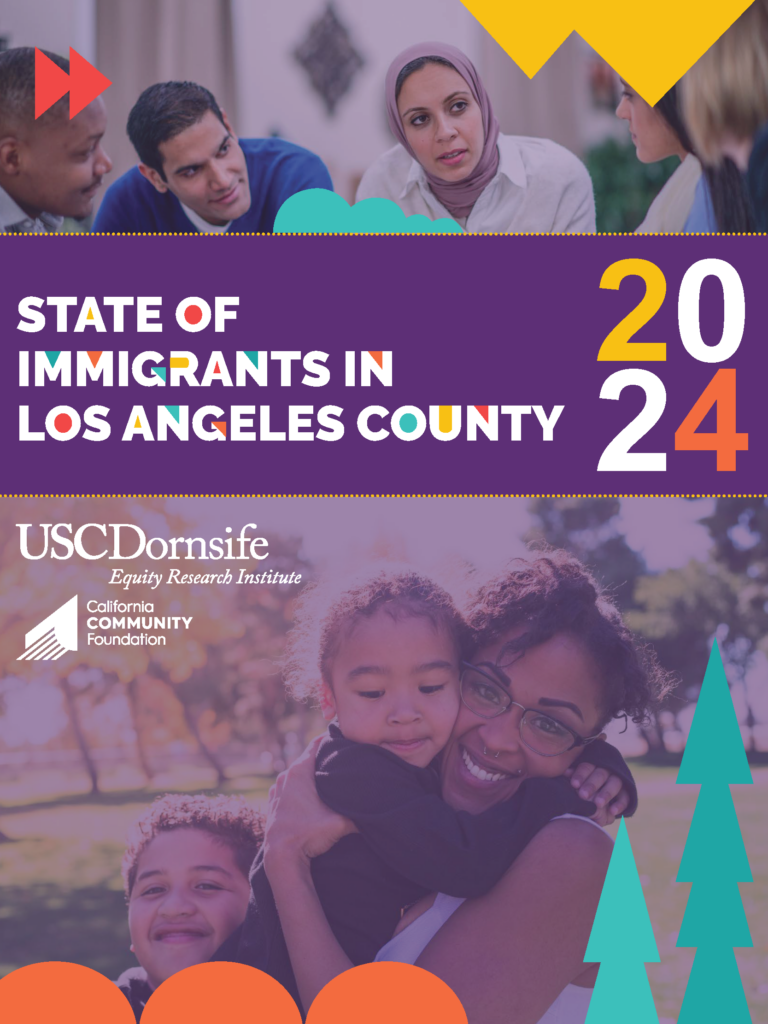
SOILA 2024
July 11, 2024
By the USC Equity Research Institute and the California Community Foundation
Main Authors: Cynthia Moreno, Khia Duncan, Dalia Gonzalez, and Thai Le
Project Team: Paris Viloria, Rhonda Ortiz, Clara Alvarez Caraveo, Fernando Moreno, Manuel Pastor, Sabrina Kim, Debora Esayas Gotta, Arpita Sharma, Jeffer Giang, Justin Scoggins, Amber Arias, Eunice Velarde Flores, and Gladys Malibiran
Amidst a pivotal election year, the 5th Annual State of Immigrants in Los Angeles (SOILA) County report uplifts remarkable strides made across Los Angeles County to advance immigrant inclusion by highlighting the realities that immigrants experience in our county—through rigorously produced data analysis—and by providing local leadership with enough direction to make tangible and meaningful change.
Different from previous years’ SOILA reports, through a publicly available online survey, we turned to immigrant communities themselves to share with us how they are feeling and faring in the county. We used that data to understand the perspectives of immigrants and their descendants, as well as to build our recommendations for this momentous year.
Now halfway through 2024, we face a difficult social and political landscape for immigrants and their families: global humanitarian crises, a looming presidential election, and exclusionary immigration policies that have fallen short of the once-lofty promises of immigration reform. At the state level, budget cuts are infringing on much-needed services to immigrant communities who often have the least access to health and economic opportunities. At the local level, housing affordability remains out of reach for many while barriers to language access exclude our immigrant residents from critical services.
Even as this political and economic landscape continues to exacerbate existing challenges and create new ones, there are still opportunities in L.A. County to build on previous policy wins and strengthen our commitment to the millions of immigrants that call this region home. In this crucial moment, we need to leverage the existing infrastructure—of funding, partnerships, programs, and resources—to continue our fight of improving the lives of immigrant Angelenos and prepare for the challenges ahead. In its 5th iteration, the goal of the State of Immigrants in Los Angeles (SOILA) County report remains the same: to highlight the realities that immigrants experience in our county—through rigorously produced data analysis—and to provide local leadership with enough direction to make tangible and meaningful change. In previous years, we accomplished the latter half of this goal through interviews of L.A. County immigrant-serving institutions and organizations that have helped us craft detailed recommendations for local leaders—elected officials, foundations, city and county departments, business entities, and more—to consider.
5th Annual Immigration Summit
The summit honored immigrants for their pivotal role in driving economic growth and shaping the cultural, economic, and social fabric of our nation through their invaluable contributions. It also emphasized the importance of creating pathways for immigrants to thrive. When immigrants are able to access education, employment, and social services, they contribute their skills and creativity to our collective success. California stands as a beacon of progress, where historic victories have expanded immigrant rights and opportunities, setting a blueprint for the rest of the nation to follow.
SOILA 2024 Report Launch | Plenary
● Cynthia Moreno – Data Analyst II, USC-ERI
● Khia Duncan – Data Analyst, USC-ERI
● Dr. Manuel Pastor – Director, USC-ERI
Presentation at the 2024 Immigration Summit by USC’s Equity Research Institute on its latest research about the experiences of immigrants living in Los Angeles County and how local leadership can make the region a more welcoming and inclusive home for all. View and download the presentation below.





